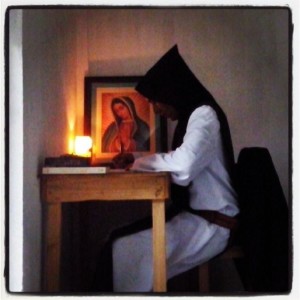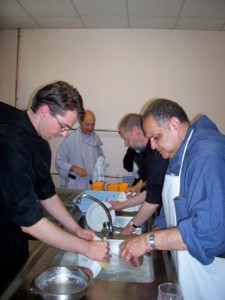[The following is a slight edited version of a newsletter article from last summer. I am republishing it because of the positive response it generated at the time.]
I had just returned from a Provincial Council meeting a year ago on March 13 when alarms began pulsing through the media about the looming pandemic. We had Solemn Vespers scheduled for Saturday evening the 14th, but as I spoke to the pastor of the local parish and to the brothers, it became clear that we would need to close our doors for the time being and cancel public services. As local and state governments got up to speed with executive orders meant to regulate the quarantine, churches, mosques, and synagogues received the somewhat dismissive label of “non-essential services.”
What this label obscured about our cloistered life is that, in fact, little changed in our day-to-day schedule, especially in that which is most essential about monastic life: our dedication to prayer, devout celebration of the Church’s liturgy, and the intensive search for God. If anything, these activities received greater prominence during this time when our guesthouse and Bed and Breakfast were closed, and we didn’t have to attend to the demands of hospitality [N.B. we’re back open!].
As I wrote on our website at the very beginning of the pandemic: “we are all members of the One Body of Christ by baptism, and the reception of Holy Communion by priests at their private Masses nourishes all the members of the Body by virtue of our unity. I have encouraged all of our monks to be aware of this, that our reception of Holy Communion during this time be done devoutly and worthily for the sake of the whole Church and the world.”
So while many Catholics were separated from Holy Communion, we monks had an especially essential service, to celebrate the Mass and be fed by Christ’s Body and Blood on behalf of the whole.
To outsiders then, it may have appeared that the monastery was just another one of the non-essential services shuttered to the public. But in fact, the monastery was the institution within the Church where business went on as usual, precisely because the monastic vocation is essential.
Shortly after entering the monastery, I read a classic book of pre-Vatican II spirituality, The Right to Be Merry, by Poor Clare author Mother Mary Frances. One idea that I found there that truly gripped me was that the powerful of this world often understand the Church better than we do. Proof of this is that hostile regimes typically go after the contemplative monasteries first. In recent times, we have seen examples of this in the Soviet Union and communist China. The contemplative life is the foothold of the Church militant in our true homeland of heaven. When the contemplative vocation is stamped out, there’s a sense in which the Church can be properly subdued and channeled toward secular ends. As long as monasteries exist, they serve as a reminder that the state is never all-powerful, that we are all answerable to God, the Just Judge.
 As we gradually reopen, it is a great blessing once again to be with our friends. I hope that the lockdown experience, though, will be a spiritual goad for us monks to tenaciously hold to the core of our calling, that persistent and uncompromising search for God, the radical desire to empty ourselves entirely that grace may illuminate the Church. Let us together pray for the whole Church, that our sufferings may strengthen the life of Christ in each of us, that we may be voices of consolation, peace, and mercy for all those laboring under the uncertainty of the present.
As we gradually reopen, it is a great blessing once again to be with our friends. I hope that the lockdown experience, though, will be a spiritual goad for us monks to tenaciously hold to the core of our calling, that persistent and uncompromising search for God, the radical desire to empty ourselves entirely that grace may illuminate the Church. Let us together pray for the whole Church, that our sufferings may strengthen the life of Christ in each of us, that we may be voices of consolation, peace, and mercy for all those laboring under the uncertainty of the present.
